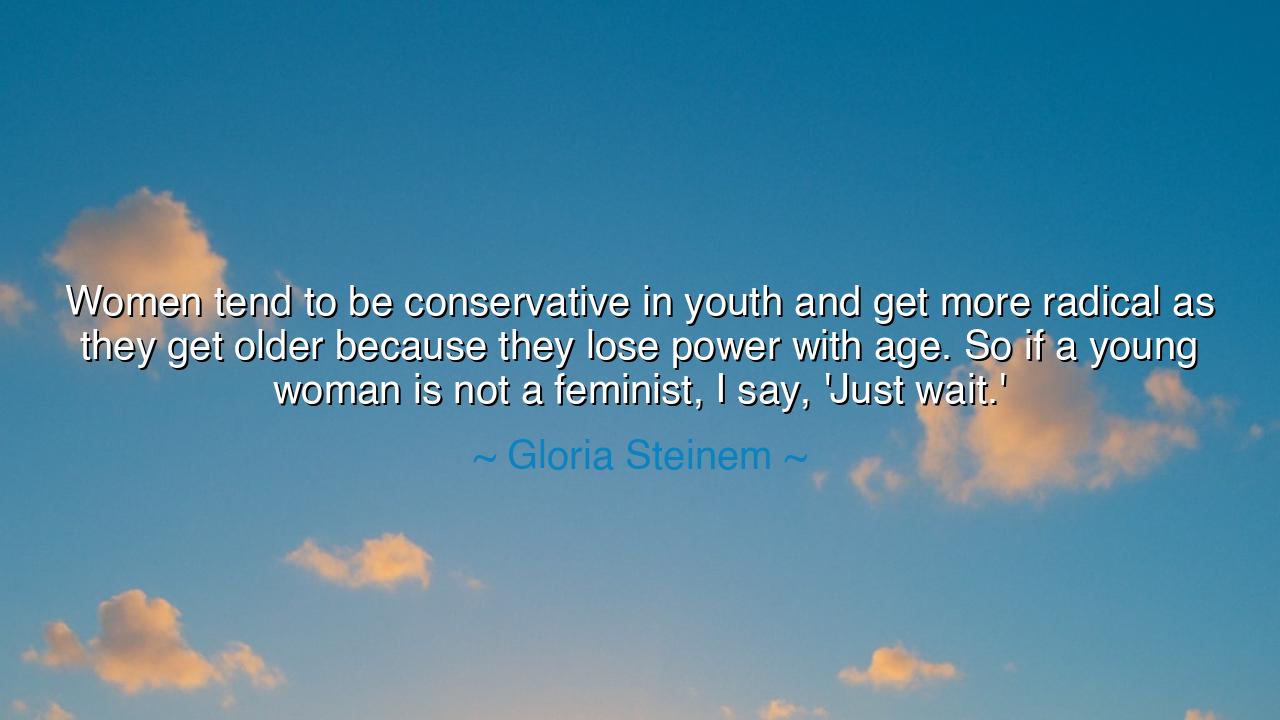
Women tend to be conservative in youth and get more radical as
Women tend to be conservative in youth and get more radical as they get older because they lose power with age. So if a young woman is not a feminist, I say, 'Just wait.'






The words of Gloria Steinem—“Women tend to be conservative in youth and get more radical as they get older because they lose power with age. So if a young woman is not a feminist, I say, ‘Just wait.’”—are both prophecy and revelation. They speak not only of women, but of the ancient rhythm of power and awakening, of the eternal struggle between illusion and truth. In the spring of life, when beauty and youth grant a woman unearned favor, the world seems generous, even just. Yet as time passes, that borrowed light fades, and the harshness of reality emerges. The power once given by others is withdrawn, and in its absence, a deeper, truer strength must be forged from within. Steinem’s words, sharp as an oracle’s flame, remind us that what youth mistakes for harmony is often only submission in disguise.
In the early years, many women walk within the gardens of acceptance. Society smiles upon them, adorns them with praise, and tells them that gentleness is virtue, silence is grace, and obedience is wisdom. It is easy, then, to think the world fair. But as age advances, the same voices that once flattered begin to fade. The attention once freely given now turns elsewhere. The woman who was once admired for her softness finds herself unseen, her worth questioned not by her deeds but by the passing of time. It is then, when illusion falls away, that she begins to see the bars of the cage that had always been around her. And from this awakening, the fire of rebellion is born.
This truth is not new; it has lived in the hearts of women throughout the ages. Consider Simone de Beauvoir, who once said that one is not born, but rather becomes, a woman. Her insight was not merely philosophical—it was a cry from within the labyrinth of expectation. Like Steinem, she saw how society trained women to live through the reflection of others, and how freedom could only be found when that mirror shattered. Or think of Sojourner Truth, who rose from the depths of slavery to ask the timeless question: “Ain’t I a woman?” In that question burned the same awakening Steinem describes—the realization that power must not be granted, but claimed.
Steinem’s words also unveil a paradox of time itself. While men are often permitted to grow in power with age—garnering respect, wealth, and wisdom—women are too often diminished by the years, judged by their fading youth rather than their growing experience. Yet it is precisely this injustice that awakens the radical spirit. For when society no longer listens to the gentle voice, the woman learns to raise her voice instead. What was once modest becomes mighty; what was once polite becomes purposeful. Thus, the radicalism of age is not rebellion for its own sake, but the natural flowering of truth after disillusionment.
Let us remember, too, that every transformation begins in silence. The young woman who is not a feminist, as Steinem says, is not blind—only yet untested. She moves within the spell of youth’s temporary power, unaware of how fragile it is. But time, the great teacher, strips away illusions with both cruelty and mercy. It forces every soul to confront what remains when beauty fades, when approval ceases, when all that is left is the self. And it is there, in that quiet reckoning, that the spirit of freedom takes root. Many women, upon this threshold, become radical not because they have changed, but because they have finally seen clearly.
We might look to Eleanor Roosevelt, once a shy young wife in the shadow of her husband, who grew into a force of conscience for a nation. In her youth, she sought harmony; in her later years, she sought justice. Her transformation mirrors the very wisdom Steinem imparts: that age can strip away illusion and reveal the strength long buried beneath it. In losing the world’s approval, Eleanor gained her voice—and through it, she gave others theirs.
Thus, the teaching of Steinem’s quote is timeless: power borrowed is never real; power built is eternal. The woman who anchors her worth in youth and beauty will find the world fickle. But the woman who builds her power upon conviction, courage, and truth will never lose it, no matter how the years may pass. Age, then, is not decay—it is ascension. It is the slow burning away of falsehood until only the pure gold of wisdom remains.
And so, to every young woman—and indeed to every soul—Steinem’s words are both warning and blessing. Do not wait for the world to strip you of illusion before you see your worth. Seek your power now, while your heart is still tender, and wield it with purpose. For if you do not awaken by choice, life will awaken you by trial. Better to rise early, with your eyes open and your spirit alight, than to wake one day to find that the years have stolen what was never truly yours. Embrace the truth now, and let your radical wisdom shine before age demands it.






AAdministratorAdministrator
Welcome, honored guests. Please leave a comment, we will respond soon